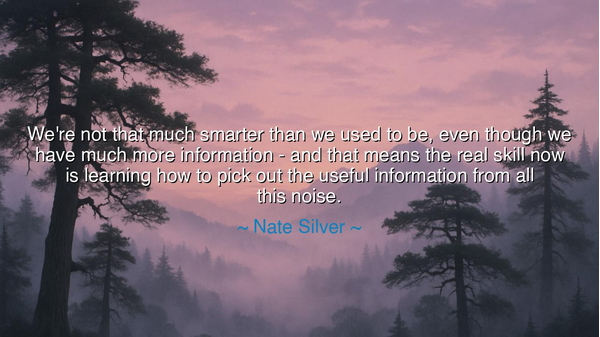
We're not that much smarter than we used to be, even though we
We're not that much smarter than we used to be, even though we have much more information - and that means the real skill now is learning how to pick out the useful information from all this noise.






Hear the sober oracle of our age: “We’re not that much smarter than we used to be, even though we have much more information—and that means the real skill now is learning how to pick out the useful information from all this noise.” In this sentence, Nate Silver lays a chisel to the marble of our vanity. He reminds us that the human mind has not been reborn merely because the libraries have grown taller. We have multiplied scrolls, not sages. Wisdom remains what it ever was: the art of selection—the courage to discard what dazzles and to keep what is true.
The ancients knew this discipline by other names. A philosopher called it discernment; a general called it reconnaissance; a healer called it diagnosis. Each faced torrents of signs and had to separate omen from illusion. So too must we in the era of infinite information: feeds that never sleep, graphs that gleam, headlines that shout. Our devices have become conch shells pressed to the ear of the world; they roar with distant storms and nearby whispers alike. To thrive, we must fashion a sieve for the soul.
Mark a tale from the sea of numbers. In 1854, when cholera gripped London, many trusted the miasma theory—the air itself accused. A quiet physician, John Snow, drew a map of deaths and traced them to a pump on Broad Street. He filtered noise with geometry and found useful information in the pattern. The handle was removed; the deaths declined. This is the parable beneath Silver’s claim: we are not saved by quantity but by clarity, not by the heap but by the hinge that turns the heap into understanding.
Our pride whispers that evolutionary leaps ride upon the next update. But the mind that doomscrolls does not outpace the mind that contemplates. A thousand facts are straw without the thread that binds them. We mistake information for insight because both shine; yet one is glitter, the other gold. The remedy is not retreat from the world’s data, but apprenticeship to the craft of reading it—humble hypotheses, patient tests, the willingness to be corrected by reality rather than confirmed by comfort.
Here lies the heart of the saying: the rare skill is not to know everything, but to know what to ignore. The wise curate their attention as gardeners prune their trees: not to diminish life, but to let fruit ripen. This pruning is an ethic. It asks us to choose sources that are accountable, to weigh claims by their methods, to prefer a dull truth to a thrilling falsehood. It asks us to honor uncertainty, to speak in ranges and confidence rather than in fanfare and fate.
Let history offer a second lantern. During the Battle of Midway, codebreakers sifted oceanic noise—intercepts and fragments—until one test (“send a false report that Midway is short of water”) turned chaos into signal. The enemy revealed itself; the battle turned. What won the hour was not a mountain of messages but a single clean inference. So too in markets, in medicine, in civic life: progress hinges less on having more and more on seeing better.
Carry away a rule of life, plain and durable. (1) Define the question before gathering data; a question is the sieve through which information becomes meaning. (2) Source like a scientist—favor track records, transparent methods, and falsifiable claims. (3) Triangulate—seek two independent lines of evidence for anything that matters. (4) Quantify uncertainty—ranges, margins, error bars; let humility be your compass. (5) Build rituals of review—weekly debriefs where you separate signal from noise and write what you would bet on and why. (6) Practice subtraction—curate your inputs; unsubscribe, unfollow, unhook what does not serve the question at hand. Do these with steady resolve, and you will prove the oracle true: though we are not much smarter, we can become wiser—by learning to pick out the useful information and letting the noise fall back into the sea from which it came.






AAdministratorAdministrator
Welcome, honored guests. Please leave a comment, we will respond soon